|
|
|
Sort Order |
|
|
|
Items / Page
|
|
|
|
|
|
|
| Srl | Item |
| 1 |
ID:
175116
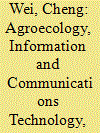

|
|
|
|
|
| Summary/Abstract |
As a bottom-up, grassroots paradigm for sustainable rural development, agroecology is particularly promising for smallholders in many countries in sub-Saharan Africa. However, by adopting agroecology, smallholders will be challenged to take on new perspectives and compile and integrate different sourced information to innovate. Today’s fast evolving information and communications technology in sub-Saharan Africa represents great opportunities for rural populations to enhance the adoption and success of agroecology and to address their daunting challenges simultaneously while conserving, protecting and enhancing natural resources. Agroecology combined with information and communications technology will probably be smallholders’ “precision agriculture” in many developing countries to enhance their food security and livelihood.
|
|
|
|
|
|
|
|
|
|
|
|
|
|
|
|
| 2 |
ID:
175114
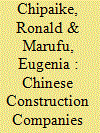

|
|
|
|
|
| Summary/Abstract |
This paper focuses on the question of labour rights in Chinese construction companies in Zimbabwe. Utilizing data collected from two companies through interviews with mainly artisans, the study established general discontentment with conditions of work in these companies by local workers. Concerns were raised over lack of adequate protective equipment/clothing, low salaries and poor communication systems among others. The government of Zimbabwe was urged (by respondents) to monitor the operations of Chinese companies in the sector and ensure that they follow the law in letter and spirit. The study established that Chinese business people exploit opportunities presented by high rates of unemployment in the country as well as Zimbabwe’s desperation as an internationally isolated state to their advantage. In such a situation, trade unions become the gap filler to improve the workers’ plight although the absence of total state support for them leaves workers exposed.
|
|
|
|
|
|
|
|
|
|
|
|
|
|
|
|
| 3 |
ID:
175111
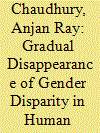

|
|
|
|
|
| Summary/Abstract |
This study examines the existence and persistence of gender disparity in education in rural and urban India. We use the sequential logit model of regression on data sets provided by three rounds of quinquennial employment and unemployment surveys conducted by the National Sample Survey Office (NSSO). The findings of the study reveal that in both rural and urban sectors of India there is gender group disparity, and this disparity is greater in the rural sector than in the urban areas. Furthermore, it is also found that the gender groups’ disparity in education in India has substantially changed during the last two decades across both sectors.
|
|
|
|
|
|
|
|
|
|
|
|
|
|
|
|
| 4 |
ID:
175115


|
|
|
|
|
| Summary/Abstract |
Despite impressive performance in terms of GDP growth after the introduction of neoliberal reforms, India continues to be the home of the largest number of hungry people in the world. The present paper is an attempt to understand two interrelated issues in this context: the impact of neoliberal reforms on agricultural development and the implication of an open economic regime on food security in India. The study reveals that the austerity measures introduced by the state in the form of decline in capital formation and public sector expenditure in agriculture have undermined the livelihood of the majority of the population in India. The implementation of the World Trade Organization’s Agreement on Agriculture along with the retreat of the state in the name of fiscal discipline has significantly reduced the bargaining power of the peasants in general and the food security of the majority of the population in particular.
|
|
|
|
|
|
|
|
|
|
|
|
|
|
|
|
| 5 |
ID:
175113
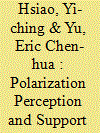

|
|
|
|
|
| Summary/Abstract |
Recently, the decline in support for democracy in consolidated democracies has gained substantial attention and provoked a heated scholarly debate (Foa and Mounk, 2016). As multiple reasons may contribute to explaining why citizens have lost faith in democratic systems, this article focuses on the linkage between political polarization and democratic support at the mass level. By using data from a recent survey conducted in Taiwan, we first construct two measures of party polarization—namely, the affective polarization score and perceived issue polarization score. While the former can be regarded as an identity-based polarization measure, the latter is a policy-based measure. Then, we explore the associations between the two polarization measures and various attitudes toward democracy. Our empirical findings suggest that Taiwanese people who have more diverse affects toward the two major parties are more likely to make a negative assessment of Taiwan’s current and future democracy and be less supportive of the democratic system. However, people who perceive a greater issue polarization between the two major parties do not necessarily have more positive or negative attitudes toward democracy. As an implication for future democratic development, this analysis suggests that affective party polarization may be harmful to the health of democracy.
|
|
|
|
|
|
|
|
|
|
|
|
|
|
|
|
| 6 |
ID:
175112
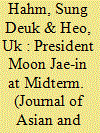

|
|
|
|
|
| Summary/Abstract |
Despite the unsuccessful outcomes of his policies on economic growth and North Korea, Moon Jae-in at midterm has received relatively high levels of job approval ratings compared to his immediate predecessors. What made it possible for him to maintain these ratings? To analyze this puzzle, we employed the three commonly noted leadership qualities—effective communication, political skill, and organizational capacity—suggested by presidential study scholars. We found that Moon Jae-in’s leadership qualities are not the compelling reason for his relatively high approval ratings. Instead, there are three alternative reasons for Moon Jae-in’s relatively high approval ratings: (a) better handling of the media; (b) collapse of the conservatives; and (c) multiple summit meetings with Donald Trump and Kim Jong-un. The latter two reasons are contextual factors, which are our theoretical contribution to the literature.
|
|
|
|
|
|
|
|
|
|
|
|
|
|
|
|
| 7 |
ID:
175110
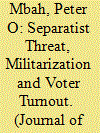

|
|
|
|
|
| Summary/Abstract |
Using the qual-dominant mixed methods approach, this study analysed the impact of the separatist threat and the militarization of elections on voter turnout during the 2017 governorship election in Anambra State, Nigeria. Findings indicate that perceived and real marginalization of the Igbo in Nigeria’s state-building is largely driving the neo-Biafra separatist threat to boycott elections in Anambra State. This does not only account for the state militarization of elections in order to guarantee security; it also inadvertently engendered fear among citizens, undermined voter turnout and exacerbated political exclusion. This study concludes that inclusive political development presents an opportunity for de-escalation of separatist threats, demilitarization of elections and enhancement of voter turnout in Nigeria.
|
|
|
|
|
|
|
|
|
|
|
|
|
|
|
|
|
|
|
|
|